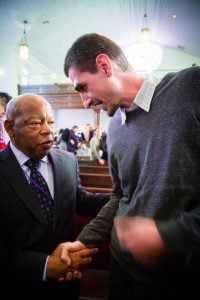 Today Christians in Durham join sisters and brothers around the world to begin the season of penance that we call Lent. Pastors and priests call us to “remember you are dust and to the dust you shall return.” Recognizing that our sinful inclination is toward hubris, we dedicate forty days to the imitation of Christ’s humility through the practices of prayer, fasting, and almsgiving.
Today Christians in Durham join sisters and brothers around the world to begin the season of penance that we call Lent. Pastors and priests call us to “remember you are dust and to the dust you shall return.” Recognizing that our sinful inclination is toward hubris, we dedicate forty days to the imitation of Christ’s humility through the practices of prayer, fasting, and almsgiving.
But this year, Christians in Durham face a challenge: we cannot give to the beggar on our city’s streets because panhandling has been outlawed in Durham.
In a consensus agenda that City Council unanimously passed at their December 2012 meeting, ordinance #14375 went on the books, effective January 17, 2013. Council has been adamant that this new ordinance does not outlaw begging in Durham. And on that point, they are technically correct. The new ordinance only outlaws begging on the medians and exit ramps where our most vulnerable neighbors have been standing to ask for our help in recent years. To these neighbors, the distinction makes little difference.
Yesterday, I listened to one man’s story. For years, he lived in the woods off of 15/501. With the help of friends from local churches, connection to social services, and the generosity of passers-by, he and his partner got an apartment. Just last month, his partner learned that she has lung cancer. She’s getting treatment at Duke Hospital, and he is caring for her at home. But this man has not been able to pay his rent since being cited for violating this new law. Come March 1st, he’s scheduled for eviction.
For the past decade, I have lived at the Rutba House, a community where the formerly homeless and the housed share life in Durham. I’ve had the opportunity to live with dozens of people who did not have a home when leaving prison, drug treatment, the hospital or the streets. As a Christian, this experience has been a sort of extended Lent for me. Sharing life together with formerly homeless friends, I’ve come to long for Christ’s humility and to celebrate the beloved community that is possible across lines that so often divide us.
What’s more, I’ve come to love Durham as a place where this sort of community is possible. In Durham, our churches are deeply invested in care for our most vulnerable. Just a few weeks ago, four hundred of us spent a whole day at Union Baptist talking about how to address our 27% child poverty rate. On New Year’s day, I sat with Mayor Bell, members of Council, and hundreds of others at Peace Missionary Baptist Church to remember the Emmancipation Proclamation of 150 years ago and to commit ourselves to the liberation of today’s captives.
In this pursuit of beloved community, Durham’s Christian community is not alone. Ours is a place where friends of other faith traditions—Jews, Muslims, Buddhists—and other neighbors of good will join hands across every kind of division, insisting that we can live together, despite our greatest fears.
I do not believe that City Council passed ordinance #14375 with malice toward our homeless neighbors. But I am convinced that they made a mistake. And I know that they need our help to change this law.
For this reason, we at Rutba House, along with many of our friends in the community, have decided to make our Lenten practice public and invite others to join us. For the next forty days, we invite Durham to pray with us for our homeless neighbors and for City Council. As we fast from food and drink, we also commit to communicate with Council personally, expressing our deep desire that they would join us in overturning this unjust law. And, in solidarity with those who are begging to survive, we commit to stand with friends who already have court dates for violating this ordinance.
The fast we have chosen is one that, we pray, will turn the hearts of our city to confess together that it is neither a crime to be poor nor to share alms with the poor. But we know that change is not easy. So, even as we begin in hope that this Lent can change Durham, we also commit to an act of civil disobedience on Monday, March 25th, if this law has not changed. In keeping with Saint Augustine, who said that “an unjust law is not law at all,” we will beg alms on behalf of our friends and suffer whatever consequences they are suffering.
This way of the cross is not comfortable for anyone, but we invite all of Durham to join us because we know that love is stronger than the powers of death. We look ahead to Easter, when Jesus rose from the grave. And we celebrate that this same Jesus is alive, walking among us in the world—even knocking on our door, asking to come in. “When you did it to the least of these, you did it unto me,” Jesus says.
I pray we might together welcome Jesus to Durham this Lent.











